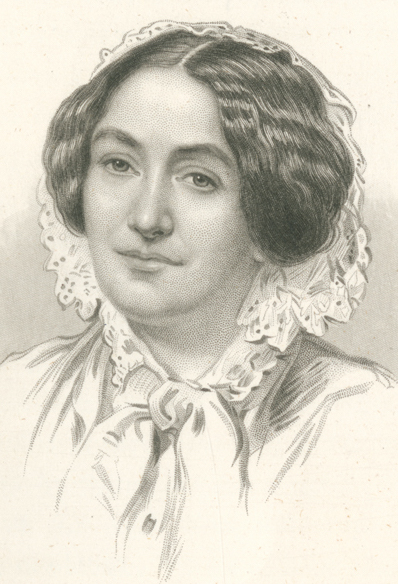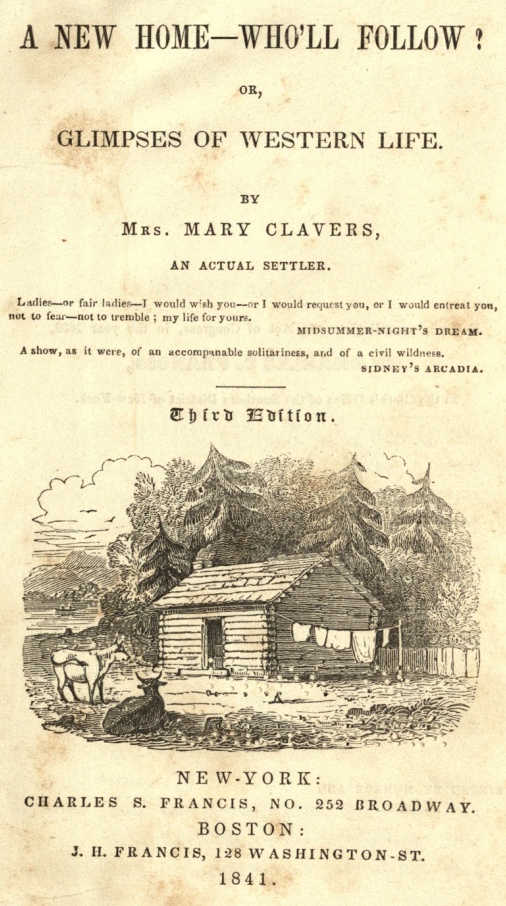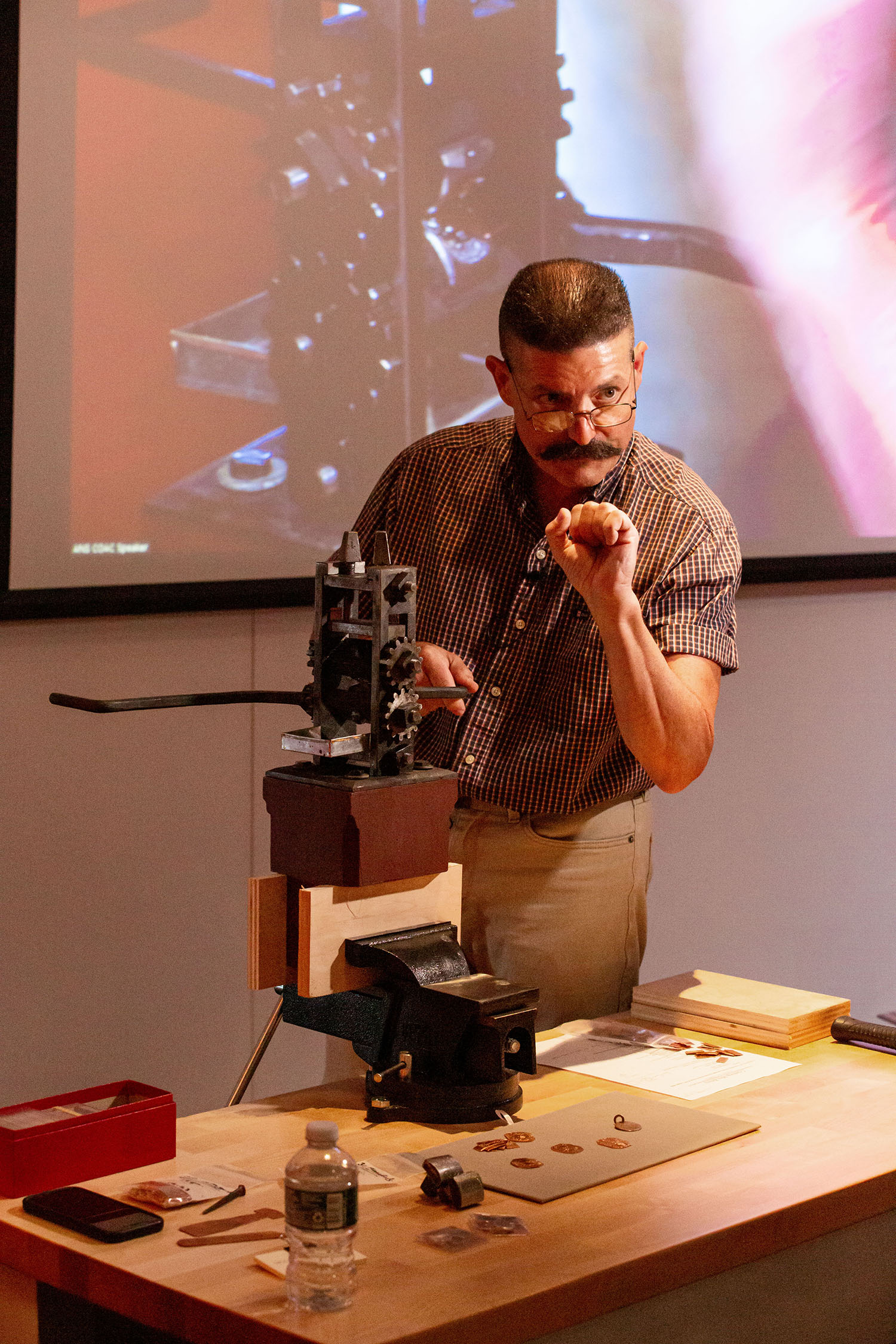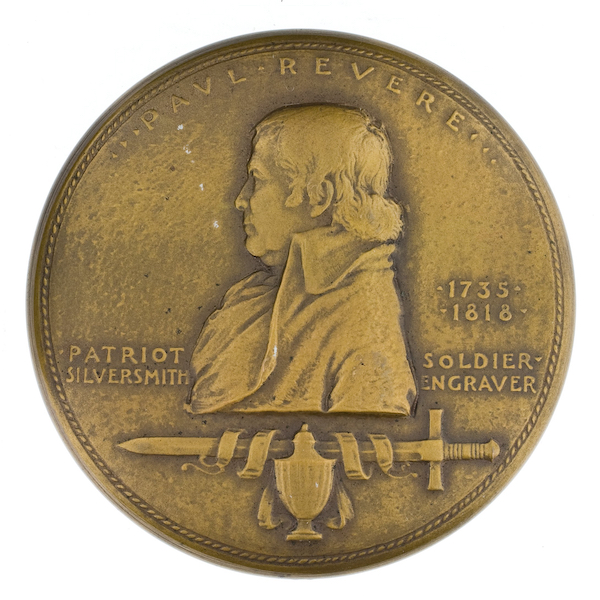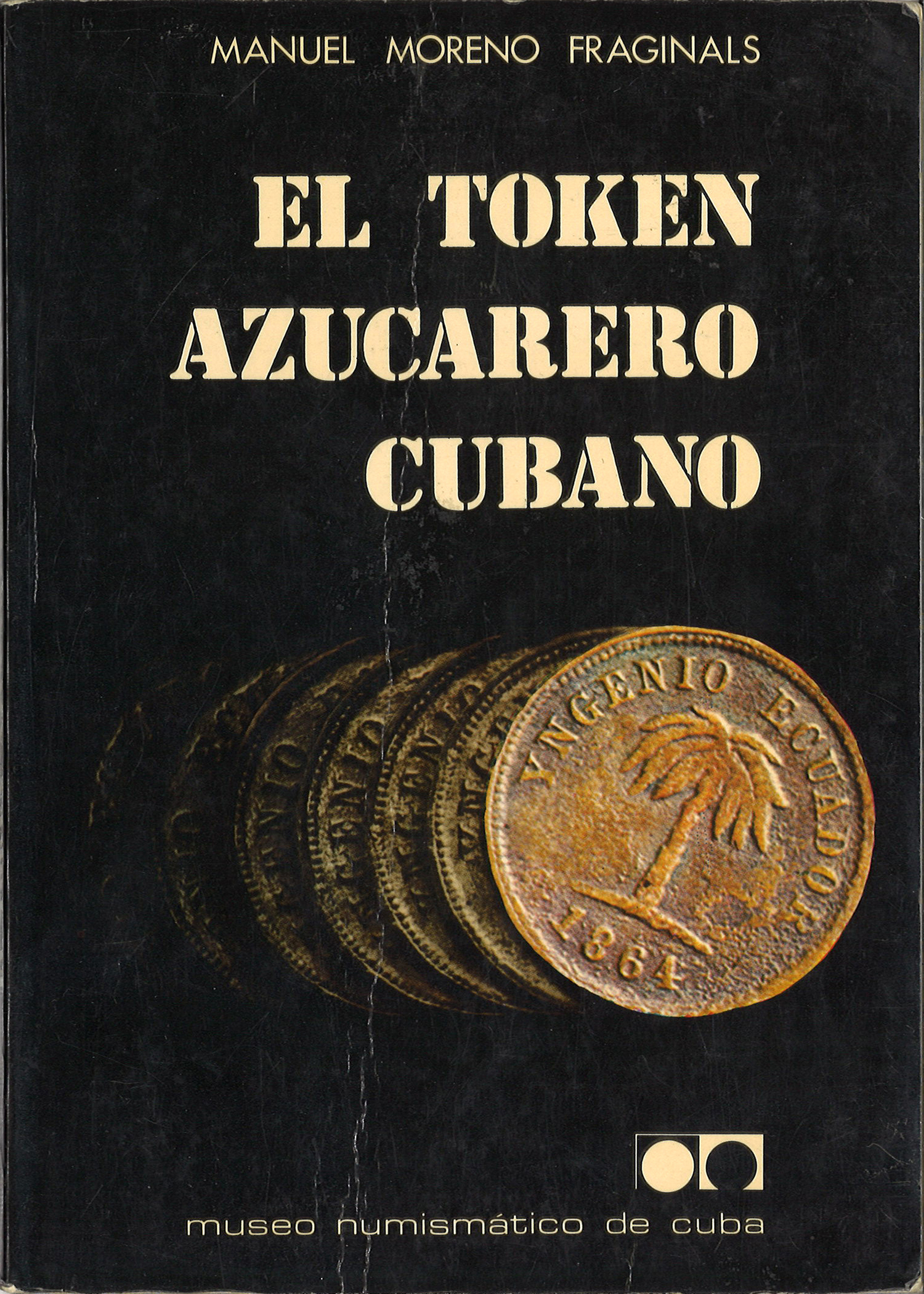The Wildcat Bank of Tinkerville
A few weeks back, I wrote a post about the Bank of Brest, one of the multitude of wildcat banks that sprouted up around Michigan after it was granted statehood in 1837 and liberalized its banking regulations. The stories of excess and chicanery that accompanied this episode are sometimes entertaining, but they also often fail to capture the impact that failed banks had on the community. It is also sometimes difficult to understand how people were fooled by what in many cases seem like transparently bad banks.
Luckily, there is a wonderful first-person account of the rise and fall of a wildcat bank by Caroline Kirkland (1801-1864). Born Caroline Matilda Stansbury, she was a well-educated woman from New York who moved to Michigan to head the Detroit Female Seminary in 1835 with her husband, classics scholar William Kirkland. William became caught up in the speculative land boom that accompanied statehood, and in 1837 purchased eight-hundred acres of land where the village of Pinckney was founded about fifty miles west of Detroit. Feeling somewhat isolated in their new environs, Caroline spent her days writing long and observant letters to friends and colleagues about the trials and tribulations of Western life. These letters coalesced into her first book, A New Home–Who’ll Follow? or, Glimpses of Western Life, which was published by C. S. Francis in 1840 and quickly became a runaway success that went through numerous editions. Writing under the nom de plume Mrs. Mary Clavers, Kirkland’s work consisted of perceptive and often satirical sketches of life in the fictionalized frontier town of ‘Montacute.’
Although undoubtedly lightly fictionalized, her account was frank enough to earn the ire of friends and neighbors who saw themselves in offending passages and disdained her portrayal of the mores that prevailed in the wilds of Michigan. The Kirklands moved back to New York City in 1843, and Caroline published two more books about her experiences out west. She was active in New York literary circles and was well-acquainted with many of the most renowned Anglo-American writers of the day. After William’s death in an accident in 1846, she continued to write to support her family and edited a variety of different publications.
In a scholarly edition of A New Home published by Rutgers University Press, Sandra A. Zagarell praises Kirkland as a “sophisticated cultural critic” who “engaged in wide-ranging, often satiric commentary on the socialcultural conventions and codes prevailing in both the eastern and western United States (xi-xii).” Indeed the lively passage excerpted below chronicling the rise and fall of the “Merchants’ and Manufacturers’ Bank of Tinkerville” is a wonderful example of her keen eye for detail and sharp wit. Kirkland’s narrative captures something of the enthusiasm that so often accompanied such ventures, at least initially, as well as the impact that these schemes had on the community. The entire book, which you can find here, is well worth a read. For those in haste, this engaging excerpt on wildcat banking will have to do.
CHAPTER XXXI.
The very next intelligence from our urban rival came in the shape of a polite note to Mr. Clavers, offering him any amount of stock in the ‘Merchants’ and Manufacturer’s Bank of Tinkerville.’ My honored spouse–I acknowledge it with regret–is any thing but an ‘enterprising man.’ But our neighbor, Mr. Rivers, or his astute father for him, thought this chance for turning paper into gold and silver too tempting to be slighted, and entered at once into the business of making money on a large scale.
I looked at first upon the whole matter with unfeigned indifference, for money has never seemed so valueless to me as since I have experienced how little it will buy in the woods; but I was most unpleasantly surprised when I heard that Harley Rivers, the husband of my friend, was to be exalted to the office of President of the new bank.
‘Just as we were beginning to be so comfortable, to think you should leave us,’ said I to Mrs. Rivers.
‘O ! dear, no,’ she replied; ‘ Harley says it will not be necessary for us to remove at present. The business can be transacted just as well here, and we shall not go until the banking-house and our own can be erected.’
This seemed odd to a novice like myself; but I rejoiced that arrangements were so easily made which would allow me to retain for a while so pleasant a companion.
As I make not the least pretension to regularity, but only an attempt to ‘body forth’ an unvarnished picture of the times, I may as well proceed in this place to give the uninitiated reader so much of the history of the Tinkerville Bank, as has become the property of the public; supposing that the effects of our ‘General Banking Law ‘ may not be as familiarly known elsewhere as they unfortunately are in this vicinity.
When our speculators in land found that the glamour had departed, that the community had seen the ridicule of the delusion which had so long made
‘The cobwebs on a cottage wall
Seem tapestry in lordly hall;
A nutshell seem a gilded barge,
A sheeling seem a palace large,
And youth seem age, and age teem youth,’
and poverty seem riches, and idleness industry, and fraud enterprise; some of these cunning magicians set themselves about concocting a new species of gramarye, by means of which the millions of acres of wild land which were left on their hands might be turned into bona fide cash–paper-cash at least, to meet certain times of payment of certain moneys borrowed at certain rates of interest during the fervor of the speculating mania. The ‘General Banking Law’ of enviable notoriety, which allowed any dozen of men who could pledge real estate to a nominal amount, to assume the power of making money of rags; this was the magic cauldron, whose powers were destined to transmute these acres of wood and meadow into splendid metropolitan residences, with equipages of corresponding elegance. It was only ‘bubble-bubble,’ and burr-oaks were turned into marble tables, tall tamaracks into draperied bedsteads, lakes into looking-glasses, and huge expanses of wet marsh into velvet couches, and carpets from the looms of Agra and of Ind.
It is not to be denied that this necromantic power had its limits. Many of these successful wizards seemed after all a little out of place in their palaces of enchantment; and one could hardly help thinking, that some of them would have been more suitably employed in tramping, with cowhide boot, the slippery marshes on which their great-ness was based, than in treading mincingly the piled carpets which were the magical product of those marshes. But that was nobody’s business but their own. They considered themselves as fulfilling their destiny.
Some thirty banks or more were the fungous growth of the new political hot-bed; and many of these were of course without a ‘local habitation,’ though they might boast the ‘name,’ it may be, of some part of the deep woods, where the wild cat had hitherto been the most formidable foe to the unwary and defenceless. Hence the celebrated term ‘Wild Cat,’ justified fully by the course of these cunning and stealthy blood-suckers; more fatal in their treacherous spring than ever was their forest prototype. A stout farmer might hope to ‘whip ‘ a wild cat or two; but once in the grasp of a ‘wild cat bank,’ his struggles were unavailing. Hopeless ruin has been the consequence in numerous instances, and every day adds new names to the list.
But I have fallen into the sin of generalizing instead of journalizing, as I promised. The interesting nature of the subject will be deemed a sufficient justification, by such of my readers as may have enjoyed the pleasure of making alumets of bank-notes, as so many Michiganians have done, or might have done if they had not been too angry.
Of the locale of the Merchants’ and Manufacturers’ Bank of Tinkerville, I have already attempted to give some faint idea; and I doubt not one might have ridden over many of the new banks in a similar manner, without suspecting their existence. The rubicund and smooth-spoken father-in-law of my friend was the main-spring of the institution in question; and his son Harley, who ‘did not love work,’ was placed in a conspicuous part of the panorama as President. I thought our Caleb Quotem neighbor, Mr. Simeon Jenkins, would have found time to fulfil the duties of cashier, and he can write ‘S. Jenkins’ very legibly; so there would have been no objection on that score: but it was thought prudent to give the office to a Tinkervillian–a man of straw, for aught I know to the contrary; for all I saw or heard of him was his name, ‘ A. Bite,’ on the bills. A fatal mistake this, according to Mr. Jenkins. He can demonstrate, to any body who feels an interest in the facts of the case, that the bank never would have ‘ flatted out,’ if he had had a finger in the pie.
Just as our Wild Cat was ready for a spring, the only obstacle in her path was removed by the abolition of the old-fashioned-and-troublesome-but-now-exploded plan of specie payments; and our neighbors went up like the best rocket from Vauxhall. The Tinkerville Astor House, the County Offices, the Banking House, were all begun simultaneously, as at the waving of a wand of power. Montacute came at once to a dead stand; for not a workman could be had for love or flour. Those beautifully engraved bills were too much for the public spirit of most of us, and we forgot our Montacute patriotism for a time. ‘Real estate pledged;’ of course the notes were better than gold or silver, because they were lighter in the pocket.
Time’s whirligig went round. Meanwhile all was prosperous at the incipient capital of our rising county. Mr. President Rivers talked much of removing to the bank; and in preparation, sent to New York for a complete outfit of furniture, and a pretty carriage; while Mrs. Rivers astonished the natives in our log meeting-house, and the wood chucks in our forest strolls, by a Parisian bonnet of the most exquisite rose-color, her husband’s taste. Mr. Rivers senior, and sundry other gentlemen, some ruddy-gilled and full-pocketed like himself, others looking so lean and hungry, that I wondered any body would trust them in a bank–a place where, as I supposed in my greenness.
In bright confusion open rouleaux lie,
made frequent and closeted sojourn at Montacute. Our mill whirred merrily, and toll-wheat is a currency that never depreciates; but in other respects, we were only moderately prosperous. Our first merchant, Mr. Skinner, did not clear above three thousand dollars the first year. Slow work for Michigan; and somehow, Mr. Jenkins was far from getting rich as fast as he expected.
One bright morning, as I stood looking down Main street, thinking I certainly saw a deer’s tail at intervals flying through the woods, two gentlemen on horseback rode deliberately into town. They had the air of men who were on serious business; and as they dismounted at the door of the Montacute House, a messenger was despatched in an instant to Mr. Rivers. Ere long, I discovered the ruddy papa wending his dignified way towards the Hotel, while the President, on his famous trotter Greenhorn, emerged from the back-gate, and cleared the ground in fine style towards Tinkerville.
A full hour elapsed before the elder Mr. Rivers was ready to accompany the gentlemen on their ride. He happened to be going that way, which was very convenient, since the Bank Commissioners, for our portly strangers were none other, did not know in what part of the un-surveyed lands the new city lay. The day was far spent when the party returned to take tea with Mrs. Rivers. All seemed in high good humor. The examination prescribed by our severe laws had been exceedingly satisfactory. The books of the Bank were in apple-pie order. Specie certificates, a newly-invented kind of gold and silver, were abundant. A long row of boxes, which contained the sinews of peace as well as of war, had been viewed and ‘hefted’ by the Commissioners. The liabilities seemed as nothing compared with the resources; and the securities were as substantial as earth and stone could make them.
If the height of prosperity could have been heightened, Tinkerville would have gone on faster than ever after this beneficent visitation. Mr. Rivers’ new furniture arrived, and passed through our humble village in triumphal procession, pile after pile of huge boxes, provokingly impervious to the public eye; and, last of all, the new carriage, covered as closely from the vulgar gaze as a celebrated belle whose charms are on the wane. The public buildings at the county seat were proclaimed finished, or nearly finished, a school-house begun, a meeting house talked of; but for the latter, it was supposed to be too early–rather premature.
CHAPTER XXXII.
All too soon came the period when I must part with my pleasant neighbor Mrs. Rivers, the opening brilliancy of whose lot seemed to threaten a lasting separation, from those whose way led rather through the ‘cool, sequestered vale’ so much praised and so little coveted.
Mr. Rivers had for some time found abundant leisure for his favorite occupations of hunting and fishing. The signing of bills took up but little time, and an occasional ride to the scene of future glories, for the purpose of superintending the various improvements, was all that had necessarily called him away. But now, final preparations for a removal were absolutely in progress; and I had begun to feel really sad at the thought of losing the gentle Anna, when the Bank Commissioners again paced in official dignity up Main-street, and, this time, alighted at Mr. Rivers’ door.
The President and Greenhorn had trotted to Tinkerville that morning, and the old gentleman was not in town; so our men of power gravely wended their way towards the newly-painted and pine-pillared honors of the Merchants’ and Manufacturers’ Banking-house, not without leaving behind them many a surmise as to the probable object of this new visitation.
It was Mr. Skinner’s opinion, and Mr. Skinner is a long-headed Yankee, that the Bank had issued too many bills; and for the sincerity of his judgment, he referred his hearers to the fact that he had for some time been turning the splendid notes of the Merchants* and Manufacturers’ Bank of Tinkerville into wheat and corn as fast as he conveniently could.
A sly old farmer, who had sold several hundred bushels of wheat to Mr. Skinner, at one dollar twenty-five cents a bushel, winked knowingly as the merchant mentioned this proof of his own farseeing astuteness; and informed the company that he had paid out the last dollar long ago on certain outstanding debts.
Mr. Porter knew that the Tinkerville blacksmith had run up a most unconscionable bill for the iron doors, &c. &c., which were necessary to secure the immense vaults of the Bank; that would give, as he presumed, some hint of the probable object of the Commissioners.
Mr. Simeon Jenkins, if not the greatest, certainly the most grandiloquent man in Montacute, didn’t want to know any better than he did know, that the Cashier of the Bank was a thick-skull; and he felt very much afraid that the said Cashier had been getting his principals into trouble. Mr. Bite’s manner of writing his name was, in Mr. Jenkins’ view, proof positive of his lack of capacity; since ‘nobody in the universal world,’ as Mr. Jenkins averred, ‘ever wrote such a hand as that, that know’d anything worth knowing.’
But conjectures, however positively advanced, are, after all, not quite satisfactory; and the return of the Commissioners was most anxiously awaited even by the very worthies who knew their business so well.
The sun set most perversely soon, and the light would not stay long after him; and thick darkness settled upon this mundane sphere, and no word transpired from Tinkerville. Morning came, and with it the men of office, but, O! with what lengthened faces!
There were whispers of ‘an injunction’–horrid sound! –upon the Merchants’ and Manufacturers’ Bank of Tinkerville. To picture the dismay which drew into all sorts of shapes the universal face of Montacute, would require a dozen Wilkies. I shall content myself with saying that there was no joking about the matter.
The Commissioners were not very communicative; but in spite of their dignified mystification, something about broken glass and tenpenny nails did leak out before their track was fairly cold.
And where was Harley Rivers ? ‘Echo answers, where ?’ His dear little wife watered her pillow with her tears for many a night before he returned to Montacute.
It seemed, as we afterwards learned, that the Commissioners had seen some suspicious circumstances about the management of the Bank, and returned with a determination to examine into matters a little more scrupulously. It had been found in other cases that certain ‘specie certificates’ had been locomotive. It had been rumored, since the new batch of Banks had come into operation, that
Thirty steeds both fleet and wight
Stood saddled in the stables day and night—
ready to effect at short notice certain transfers of assets and specie. And in the course of the Tlnkerville investigation the Commissioners had ascertained by the aid of hammer and chisel, that the boxes of the ‘real stuff’ which had been so loudly vaunted, contained a heavy charge of broken glass and tenpenny nails, covered above and below with half-dollars, principally ‘ bogus.’ Alas, for Tinkerville! and alas, for poor Michigan!
The distress among the poorer classes of farmers which was the immediate consequence of this and other Bank failures, was indescribable. Those who have seen only a city panic, can form no idea of the extent and severity of the sufferings on these occasions. And how many small farmers are there in Michigan who have not suffered from this cause ?
The only adequate punishment which I should prescribe for this class of heartless adventurers, would be to behold at one glance all the misery they have occasioned; to be gifted with an Asmodean power, and forced to use it. The hardiest among them, could scarcely, I think, endure to witness the unroofing of the humble log-huts of Michigan, after the bursting of one of these Dead-sea apples. Bitter indeed were the ashes which they scattered!
How many settlers who came in from the deep woods many miles distant where no grain had yet grown, after travelling perhaps two or three days and nights, with a half-starved ox-team, and living on a few crusts by the way, were told when they offered their splendid-looking bank-notes, their hard-earned all, for the flour which was to be the sole food of wife and babes through the long winter, that these hoarded treasures were valueless as the ragged paper which wrapped them! Can we blame them if they cursed in their agony, the soulless wretches who had thus drained their best blood for the furtherance of their own schemes of low ambition? Can we wonder that the poor, feeling such wrongs as these, learn to hate the rich, and to fancy them natural enemies?
Could one of these heart-wrung beings have been introduced, just as he was, with the trembling yet in his hearty and the curses on his lips, into the gilded saloon of his betrayer, methinks the dance would have flagged, the song wavered, the wine palled, for the moment at least.
Light is the dance and doubly sweet the lays
When for the dear delight another pays–
But the uninvited presence of the involuntary paymaster, would have been ‘the hand on the wall’ to many a successful (!) banker.
After public indignation had in some measure subsided, and indeed such occurrences as I have described became too common to stir the surface of society very rudely, Mr. Harley Rivers returned to Montacute, and prepared at once for the removal of his family. I took leave of his wife with most sincere regret, and I felt at the time as if we should never meet again. But I have heard frequently from them until quite lately; and they have been living very handsomely (Mr. Rivers always boasted that he would live like a gentleman) in one of the Eastern cities on the spoils of the Tinkerville Wild Cat.


